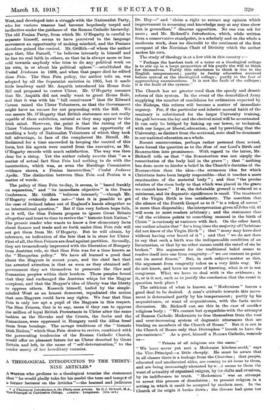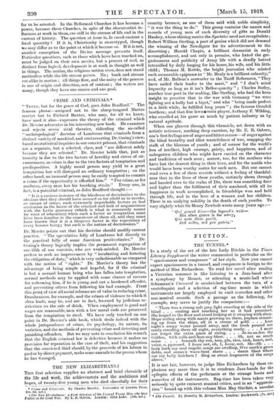A THEOLOGICAL INTRODUCTION TO THE THIRTY- NINE ARTICLES.* A warren
who prefixes to a theological treatise the statement that " he would gladly take for his model the tone and temper of a former lecturer on the Articles "—the learned and judicious
, Theological Introduction to Ms Thirty-nine strifeless ByMennen. ILA.,
{ke•Princlyal Cuddeadon College. .oeidon: Longman,. feta. nekl
Dr. Hey—" and ' claim a right to retract any opinion which improvement in reasoning and knowledge may at any time show him is groats-Nes; " disarms opposition. No one can ask for more ; and Mr. Bicknell's Introduction, which, while written from a conservative standpoint, is a scholarly and on the whole a moderate work, does no discredit to the sentiment of the first occupant of the Norrisian Chair of Divinity which the author makes his own.
The study of theology is at a low ebb in this country
" Perhaps the hardest task of is tutor at a theological college is to stir up in a large proportion of his pupils the will to think for themselves. Partly this reluctance to think is due to the FInglish temperament ; partly to faulty education received before arrival at the theological college ; partly to the fear of approaching examinations. It ie not the fault of the colleges ; it is the fault of the erstem."
The Church has no greater need than the speedy and drastic reform of this system. In the event of the demobilized Army supplying the number of candidates for ordination expected by the Bishops, this reform will become a matter of immediate urgency. For, if the particular and inferior mental habit of the seminary is substituted for the larger University training, the gulf between the lay and the clerical mind will be accentuated It can only be bridged by linking up our lower, or technical, with one' larger, or liberal, education; and by providing that the University, as distinct from the ecotional, note shall be do 'mutant in our national education as a whole.
Recent oontroveraies, perhaps rather personal than actual, have forced the question as to the How of our Lord's Birth and Resurrection into prominence. With regard to the latter, Mr. Bicknell tells us that " the Resurrection was not simply the resuscitation of the body laid in the grave " ; that " nothing has done more to hinder a bolief in the Church's doctrine of the Resurrection than the idea—the erroneous idea for which Christians have been largely responsible—that it teaches a mere reanimation of the material body" ; and that "the precise relation of the risen body to that which was placed in the grave we cannot know." If so, the debatable ground is reduced to a minimum, and its dogmatic significance is small. The treatment of the Virgin Birth is less satisfactory. The assertion that the silence of the Fourth Gospel as to it " is a token of assent " is more than disputable; the interpretation given LC:John viii. 4l -mill seem to most readers arbitrary ; and the statement that "all the evidence points to something unusual in the birth of Christ" is curiously at variance with fact, On the other hand, our author admits that " for a long time the majority of Christians did not know of the Virgin-Birth " ; that " many may have died without having ever hoard of it " ; and that " we do not dare to say that such a birth wag the indispensable condition of an Incarnation, or that by no other means could the entail of sin be broken." His argument for the traditional belief seems to resolve itself into one from congruity—" we are content to point out its moral fitness." But, in such subject.mattor as this, the argument from congruity takes us a very little way. We do not know, and have no means of knowing, what is or is not congruous. What we have to deal with is the evidence ; is it, or is it not, such as to justify the conclusion that the event in .question took place ?
The criticism of what is known as " Modernism " leaves a good deal to be desired. A man's attitude towards this move. ment is determined partly by his temperament ; partly by his acquaintance, or want of acquaintance, with the facts under discussion. Mr. Bicknell can see this in the case of another religious body : " We cannot but sympathize with the attempts of Roman Catholic Modernists to free themselves from the vast and ever-increasing system of dogmatic utterances that are binding on members of the Church of Rome." But it is not in the Church of Rome only that Diotrephes " loveth to have the pre-eminence." As a poet, himself a Roman Catholic, reminds us-
" Priest;- of all religions are the same."
" We have never yet met a Modernist kitoken-maid," says the Vice-Principal—a little cheaply. He must be aware that in all classes there is a leakage from the Churches ; that people, educated and uneducated alike, are coming to sit loose to them, and are being increasingly alienated by w...tt seems to them the want of actuality of organized religion, by its ohifte and evasion; by its indifference to truth. " Modernism " was an attempt to arrest this process of dissolution ; to present religion in a setting in which it could be accepted by modern men. In the Church of its origin it broke down ; the disease had gone too
far to be arrested. In the Reformed Churches it has become a power, because them Churches, in spite of the obscurantist in- fisences at work in them, aro still in the stream of life and in the current of history. The question at issue is, Is creed-content a fixed quantity ? If it is, Christianity is stereotyped, though wo may differ as to the point at, which it became so. If it is not, another conception of the Divine message presents itself. Particular questions, such as those which have boon touched on, must be judged on their own merits, but a process of real, as distinct from logical, development is at work in thought as well in things. Tho notion, the religious notion even, does not stand motionless while the life stmam passes. No ; bank and stream aro alike in motion ; all things flow, and the unity of the process is one of origin and direction, not of content ; the waters aro many, though they have one source and one goal.







































 Previous page
Previous page